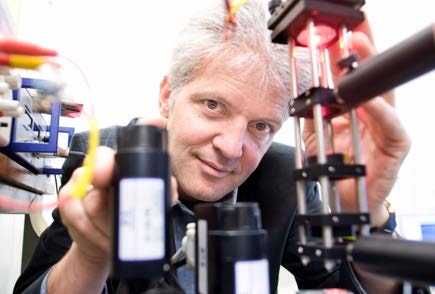COLLOQUIUM 2024
Nanotechnology for single-molecule biology:
from nanopore protein sequencing to chromosome organization
| Speaker | Distinguished Prof Cees Dekker, Kavli Institute of Nanoscience, Delft University of Technology, The Netherlands |
| Date/Time | Wednesday, 6 Nov, 3PM |
| Location | Lecture Theatre 32 |
| Moderator | A/Prof Slaven Garaj |
Abstract
Nanotechnology offers fantastic opportunities to contribute to biology. I will present some recent examples from my lab where nanotech single-molecule tools are used to unravel the biology of cells down to the single-molecule level.
1. A DNA origami turbine powered by nanoscale flow [1]
We recently built artificial nanoscale turbines. We demonstrated driven rotary motion of a nanoscale DNA origami turbine which harnessed energy from a water flow generated by a static chemical or electrical potential gradient in a solid-state nanopore. The origami nanoturbine consisted of a 6-helix DNA bundle that adopted a chiral conformation upon phoretic docking onto the nanopore and subsequently displayed a sustained unidirectional rotary motion of up to 20 revolutions/s. These artificial nano-engines operate autonomously in physiological conditions, converting energy into useful mechanical work.
2. Nanopore-based sequential reading of peptides [2]
We recently demonstrated a nanopore-based single-molecule peptide reader capable of reliably detecting single amino-acid substitutions within individual peptides. A peptide is linked to a DNA molecule and sequentially pulled through a biological nanopore by a DNA helicase in single amino-acid steps. Stepping ion-current signals enable discrimination of single-amino-acid substitutions in single reads. Notably, we demonstrated the capability to ‘rewind’ peptide reads, obtaining indefinitely many independent reads of the same molecule, yielding an undetectably low error rate in single-amino-acid variant identification. Recently, we expanded this concept to discriminating single post-translational modifications within peptides of mixed charge. These proof-of-concept experiments constitute a promising basis for the development of a single-molecule protein sequencer.
3. Real-time imaging of DNA loop extrusion by condensin and cohesin SMC complexes [3]
Structural Maintenance of Chromosomes (SMC) proteins like cohesin and condensin spatially organize chromosomes by extruding DNA into large loops. Using single-molecule assays, we provided unambiguous evidence for loop extrusion by directly visualizing the processive extension of DNA loops by SMCs in real-time. In recent extensions of this work, we showed how this process occurs on supercoiled DNA, that SMCs also can exhibit phase condensation, and that SMC proteins can bypass huge roadblocks of bound proteins on DNA.
References:
[1] X. Shi et al, Nature Physics 18, 1105 (2022); X. Shi et al, Nature Nanotechnology 19, 338 (2024)
[2] H. Brinkerhoff et al, Science 374, 1509 (2021); I. Nova et al, Nature Biotechnology 42, 710 (2024)
[3] Ganji et al, Science 360, 102 (2018); Kim et al, Nature 579, 438 (2020); B. Pradhan et al, Cell Reports 41, 111491(2022)
Lectures in this series

Biography
Cees Dekker is a physicist who moved from quantum solid-state physics to nanobiology. In the 1990s, he pioneered nanotechnology and discovered many of the exciting electronic properties of carbon nanotubes, establishing the first single-molecule transistor. In 2000, he moved to single-molecule biophysics and nanobiology, applying nanotechnology to biological systems and enforcing various breakthroughs from DNA and protein sequencing with nanopores to DNA loop extrusion by novel motor proteins. His current research focuses on nanopores, chromosome structure, and developing synthetic cells. Characteristically, Dekker pioneers new fields and defines new directions, both organizationally in e.g. establishing the Kavli Institute and a new Department of Bionanoscience at Delft and spearheading international initiatives to build synthetic cells, but more importantly also scientifically – by pioneering molecular electronics and nanobiology yielding major discoveries from nanopore sequencing to DNA loop extrusion by motor proteins.
Read more: http://ceesdekkerlab.nl
